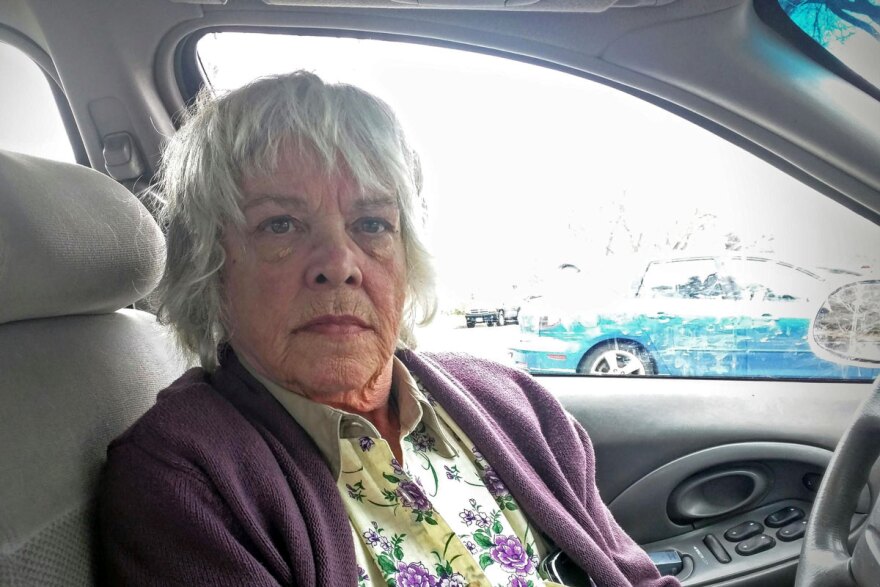The Front Range's booming economy is good news for many. Yet fast growth has caused a housing crunch from Denver to Fort Collins.
Rising rents and home prices are squeezing a vulnerable population: seniors. Groups that work to help lower-income older adults say they are having a harder time placing seniors in subsidized housing and also starting to see more of this population lacking a place to call home.
Judith Corrado lives in Fort Collins. She's 71 and energetic, despite suffering from the respiratory ailment COPD. She agreed to tell her story because she wants to shed light on what she believes is a widespread problem. Corrado, and older adults like her, are increasingly having a hard time finding affordable places to live.
"I have an awful lot of people I know that are in horrendous situations because they can't get housing," she said. "The prices are insane. $1,300 for a studio? And then you pay utilities."
Corrado stays with her son right now, but finances in his household are tight as well, and her current living situation is stressful. She works part time, but that income plus her $850 a month from her Social Security check wouldn't even clear the rent on most Fort Collins apartments.
She once had savings to fall back on. After helping her adult children -- one lost his job in the recession, another underwent expensive cancer treatments -- that money is now gone, she said. She's even thought about moving somewhere cheaper.
"You know, I can go to Nebraska and rent a place for $200," she mused.
The problem with that? She doesn't know anyone. After 30 years in Colorado, her friends and family are here. Her doctors are here. The vet that knows how to care for her dog is here. At her age, starting over in a new place seems nearly impossible.
So Corrado reached out to Lutheran Family Services, which is helping her find a subsidized apartment. If she can get into one of those, she'll pay about a third of her income in rent.
Placing seniors like Corrado in affordable housing is getting more and more difficult, said Alison Dawson, a Lutheran Family Services caseworker. A few years ago, it was relatively easy to get seniors into apartments. The waitlist would be three, maybe four months.
"Now, the lists are super long," said Dawson -- waitlists can now be one or two years.
There are more and more seniors like Corrado, and the number of available housing units is not keeping pace. Some facilities have such lengthy waits they've closed their lists altogether.
Not all of Dawson's clients were always low income. Many of them, she said, have long been productive members of the community. Aging, however, is a tipping point. They stop earning, or maybe a spouse dies or they suffer an unexpected medical emergency. Rapid increases in rents catch them off guard, or rising property taxes stretch their finances too thin. So far, she's managed to keep all her clients from becoming homeless.
While many seniors may lack affordable housing, it doesn't always mean their next step is the street. Guy Mendt, Larimer County Regional Director of of Catholic Charities, said his shelter has yet to see an increase in seniors they shelter. It was 63 in 2015.
What is changing, Mendt said, is how long it takes to get them back into a stable place to stay.
"The length of time these seniors are homeless has almost doubled," Mendt wrote in an email.
Also, not all seniors who are homeless opt for shelters. Judith Corrado said some of her friends, many who have a cherished pet companion, often prefer to stay in their cars.

Gary Sanford, executive director of the Metro Denver Homeless Initiative, said it's hard to count the homeless population generally, and seniors are no exception. He agreed that affordability is a growing problem among this population.
"The seniors that are on fixed incomes are really being squeezed with the increasing rents," Sanford said.
Of those that may not stay in shelters, some may find a place in rent-by-the-week motels, couch surf, or double up with family. Older adults may avoid shelters because they find them difficult to navigate, particularly if they are on oxygen or have other medical needs.
Front Range service providers that focus on the elderly say they are seeing an increase in calls for services. The Denver Regional Council of Governments Area Agency on Aging, which serves adults over 60 throughout the metro region, said nearly 20 percent of the referrals it made through March 21, 2016 were housing related.
Other agencies have similar stories to tell. Colorado Housing Connects started a new hotline in mid-2014 to take calls from those struggling with housing. With almost no promotion or marketing, the annual call volume for 2015 was 16,641, or one call nearly every seven minutes the hotline is open.
_
A fifth of those calls came from seniors, said Stephanie Seifried, Grants and Communications Coordinator for Brothers Redevelopment, which helps run the hotline.
On a recent visit to Denver's Senior Support Services — a day shelter that provides three meals a day as well as support finding social services and housing — long lines of older adults crowded the hallways, waiting for food, clothing, and other assistance.

The low-slung, 4,000-square-foot building on the edge of Uptown bustled with activity, as a small staff worked to meet the needs of an ever-increasing population of low-income elders. One of their priorities is getting the population they serve, many of whom are homeless, into subsidized apartments.
Once homeless adults do get into housing, it is, for most of them, immensely stabilizing, say experts.
Alma Walker is one example. The 71-year-old grins widely as she tells the story of getting her apartment. Walker, moved back to Denver in 2014, hoping to find work, but was unsuccessful in her search. Without a place to stay, she lived in her car. She had filled out form after form, week after week, and been on a waiting list for housing for several months..
Then one day, she was eating "a hot dog, a dollar hot dog at Sonic," when she got the call.
Walker was so excited to get the apartment, she raced down to sign the lease at exactly that moment. She's been living there since September 2015.

Two other formerly homeless adults, David Bell, 57, and James Worline, 58, also got help from Senior Support Services. Prior to getting subsidized housing, the couple lived in a tent by Denver's Clear Creek. They preferred that to staying in shelters, which they said had too many people abusing drugs and alcohol.
Now, they have a one-bedroom apartment that costs a third of their income. They are slowly and surely making it a home - they just bought a TV - a small one, Worline clarifies, with a grin flickering across his face.
In both of these cases, finding housing was the first step in helping these adults return their lives to normal. Worline now feels like he can focus on finding a job. He and Bell also plan to get married. Alma Walker works at Senior Support Services, helping at the front desk.
Yet available homes for the neediest, like much of the Front Range's housing stock, are increasingly hard to come by. Ted Pascoe, executive director of Senior Support Services, said even though there are efforts to create more affordable housing in the metro area, other apartments that were once affordable are exiting federal subsidy programs and going on the open market.
"So it may get worse before it gets better."






